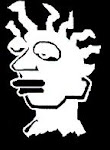I.Q. tests don't really measure intelligence - what they actually measure are gaps in intelligence.
Think of the tests as reference points on a Mo-Cap model.
The dots are useless unless one is able to fill in the spaces between the gaps - otherwise one just has a series of seemingly random dots with no purpose.
I.Q. tests just test ones ability to recognize and organize each reference point.
Like saying that being able to quote Faust is more important than being able to quote Pooty Tang - the author of the test determines the value of the answers.
Most of these test use an Occidental point of view as their starting point and anyone not familiar with this view is deemed to be inferior.
But what of those who can fill in the blanks without using such models or reference points?
What value is there in intuition,
or faith,
or talent?
What of one who ignores these constructs and decides to learn what is of real value to himself?
What do we do with one who has learned and excelled within the limitations of these rules but who has chosen to discard them in favor of a more natural process which can be understood by many?
What do we do with the one who seeks the simple instead of the esoteric?
Wednesday, July 20, 2011
Subscribe to:
Post Comments (Atom)















7 comments:
IQ tests have been shown to not be a good measure of actual intelligence, but they are pretty good at measuring one's ability to function in the society in which the test is created.
IQ tests, unlike the SAT or other achievment tests, does not rely on literature or other things that could be considered high brow vs. pop, but is more logic and spacial reasoning centered.
SO while knowing Faust may not be a direct benefit on such a test, a higher vocabulary that allows one to better understand and communicate precisely... which is nothing but beneficial in society, will give an advantage and equal a higher score. Being able to view an object and interpret its position and usefulness will also gain a higher score...
What the test doesn't tell you is if you have sense enough to not lead with a straight right and instead protect your abdomen, countering with an uppercut to the jaw once the body blow has been deflected.
That you learn from getting hit a few times.
no.
the conflation of early scholastic aptitude and native intelligence is the longstanding source of a great deal of confusion.
Binet's test was never intended to peg native intelligence, that's not what he had in mind at all when he designed these tests in the first place.
matter fact, that's all pure-dee-pure disinformation and misinformation swirling around the bowl of popular culture since Termin an'em appropriated Binet's benign testing for their own pernicious and fraudulent racist social darwinian agenda.
Feh. IQ tests are good at telling how well you do on IQ tests.
Remind me to tell you the story of how I once outwitted a Siberian tiger AND a grizzly bear with only a Number 2 pencil.
Emotional intelligence is THE key. Anybody can score high on the silly IQ tests. But without emotional intelligence they will not go far.. For example an Aristotle Onassis. Al Capone, among others.
great...,
now native intelligence is conflated with sociopathic and psychopathic behavioral models as examples of "success".
having effective mirror neurons that enable you to model social behavior, but lacking the limbic filtering to enable you to empathize - is a recipe for serious, serious monsterhood...,
Personally, I was referring to monetary, financial success. Whether these examples are to be considered "monsters" depends on the light one views them in.
Brings to mind the saying "behind every great fortune, there is a great crime" Sociopathic or pschopathic then becomes relative.
Man... and all I was doin was setting up a two sentence fight scene. It has turned into a brawl. According to this very scientific UBJ IQ test I am an evil genious. I'm off to the petting zoo.
Post a Comment